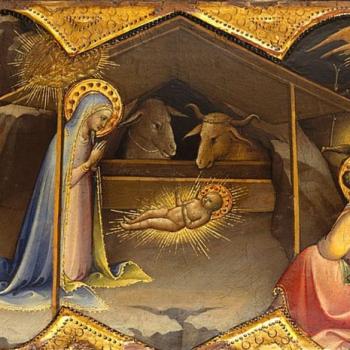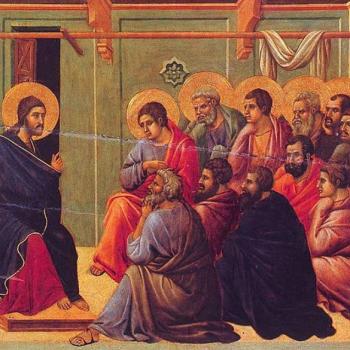Today’s man struggles to understand his role as father. This means we also struggle to understand what Jesus said about God.
The Ancient Household
Ancient Mediterranean society was built on the “household,” or the oikos.
The household included all immediate family members, servants, free workers, and slaves. Roman thinkers believed that a healthy society depended on well-ordered households. This wasn’t just an abstract “family values” idea. The household told each individual who they were and how they fit into society. The household protected the honor of each member and provided for their needs. People were loyal to their household first, and the state was a network of households loyal to their governors and to the emperor.
The Pater Familias
The household depended on the leadership of the Pater Familias. The Pater Familias was usually the oldest living male in the household. The Pater Familias had absolute authority and absolute responsibility for his household:
- Authority and Respect: All family members, including his wife, children, and slaves, were expected to obey and respect the decisions and commands of the Pater Familias.
- Marriage and Family: The Pater Familias had the power to arrange marriages for his children. He chose marriages that were good for the household socially and economically. He could also dissolve marriages if deemed necessary.
- Inheritance: The Pater Familias controlled the distribution of property and wealth within the family. He had the authority to determine the inheritance rights of his children, including the allocation of land, money, and other assets.
- Discipline: The Pater Familias had the right to discipline his family members, including his wife, children, and slaves. This included the power to impose physical punishment or even sell slaves.
- Religious Observances: The Pater Familias was responsible for conducting religious rituals and maintaining ancestral traditions within the household. He played a crucial role in ensuring the religious well-being of his family and honoring the gods and ancestors.
- Financial Management: It was the duty of the Pater Familias to manage the household’s finances. He was responsible for overseeing economic affairs, including property management, agricultural activities, and trade.
- Education and Upbringing: The Pater Familias had the responsibility to educate and train his children. He would oversee their moral and intellectual development, teaching them important skills, values, and virtues necessary for their future roles in society. He was also responsible to teach his wife how to help him manage the estate.
- Legal authority: He had the power to make decisions on behalf of the family and represented them in legal matters. He could enter into contracts, initiate legal proceedings, and make binding decisions that affected the entire household.
- Protection and Defense: The Pater Familias was tasked with safeguarding the family’s interests and protecting them from external threats. In times of war, he might be called upon to serve in the military for the defense of the state.
The Modern Father
In our culture, the father is not the Pater Familias. For us, the father is a sitcom dad like Homer Simpson.

He’s a working man. He’s not too bright. His wife and children are much more capable than he is. He’s not clear on his role in the family or the world. He has all the urges of outdated masculinity, but he doesn’t know what to do with them. He can’t articulate his ideas. He struggles to adapt to modern life.
Jesus taught his disciples to think of God as “our heavenly Father.” We think of a sitcom dad, and who needs a God like that?
But of course Jesus meant the Pater Familias, and his original audience would have understood. In Jesus’ time, your honor came from your father. You were judged on your father’s reputation, for better or worse. He protected you. He paid for everything you needed. He taught you everything he knew. He passed on his wealth to you.
To be successful in Jesus’ time, you needed a good, intelligent, wealthy, respectable father. A bad father could ruin everything.
God As Father
Jesus taught that we have the best possible Pater Familias. The Creator and King of the universe is our father. God’s honor is our honor. God’s wealth is our wealth. God’s wisdom is our wisdom. God’s name is our name. God protects us like a good father protects his family. There is hope for the future. Our lives have meaning. We are safe, because God is our Father.
Today’s criticism of societal patriarchy is valid and necessary. A system that makes every father into the dictator of his household is a recipe for abuse. But reducing masculinity/fatherhood to something that is useless or bad is just as harmful as elevating fathers to a position of absolute authority. When we dishonor fatherhood, don’t give men a positive identity to aim for. And we deny the truth that most of us aren’t Homer Simpson. Most fathers are people who want the best for our families, and work hard for the good of our household.
A positive understanding of God is crucial to a healthy spirituality. Jesus gives us such an understanding in the metaphor of God-as-Father. As always, we have some contextual work to do to understand what he meant. But if we can understand God as the best possible version of the Pater Familias, we can live in a universe where we are honored, protected, and provided for. And as fathers, we can work to embody that same spirit of love, honor, and care as we try to understand ourselves in a world that is confused about what fatherhood means.












